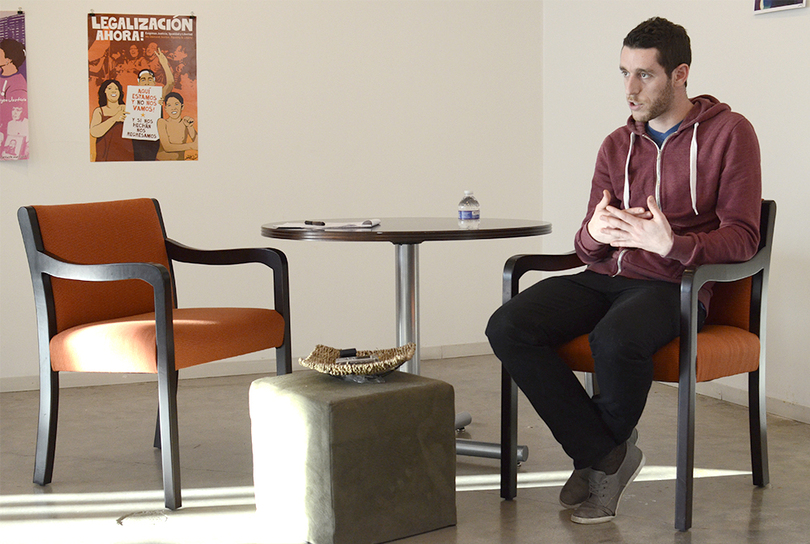Live and learn: Members of Syracuse community share stories of learning at La Casita Cultural Center
Colorful posters with slogans like “legalization right now” in Spanish lined the walls. Two linen chairs sat around a small table and the sun shone through massive glass windows.
It set the scene for sharing stories.
The second event of “Your Story!” was hosted at La Casita Cultural Center, a green cubic building located a five-minute walk from The Warehouse in downtown Syracuse, from 5 to 6:30 p.m.
“Your Story!” is a community event held to preserve local history and culture through oral historical interviews. Four topics have been chosen for discussion: migration, prison, learning and love.
This week was about sharing learning experience. Migration stories were shared in the center, and prison stories were told at Beauchamp Library in earlier weeks. Joan Bryant, associate professor of African American Studies, hosted the interviews.
“It is for people to share stories and learn something about world history,” Bryant said. “Also community members learn about their community.”
Bryant, who runs the event as a part of the Black Syracuse Project, also mentioned that last week’s topic, which focused on prison stories, had the biggest attendance. It featured two women talking about their parents in prison.
Oral history is a common way to document people’s stories, Bryant said, especially when people don’t have paper records.
“A lot of people don’t keep records of their lives. It’s a way to encourage people to record their memories, share their memories and talk about their memories,” Bryant said.
Wearing a loose V-neck sweater and a big, genuine smile, speaker Cynthia Kagan, a musician and singer, started a memorable, intimate conversation and drew listeners in to her colorful and interesting childhood.
Kagan grew up in a small town in Alabama. Being in a closely bonded and well-educated family, her parents have a big influence on her about how to act and interact with others.
“Learn how to be a girl. How you behave is determined by other females in the family,” Kagan said.
She said she experienced a big culture shock when she moved from a segregated, primarily black school in Alabama to a more diverse school in Michigan. She had become accustomed to all of her teachers and the students being black.
“We were so isolated,” Kagan said. “It took us six months to get over it and stop staring at people. We didn’t know what to do.”
She became involved in singing and dancing.
When Kagan looks back at her life, she feels grateful for being involved in music.
“I’m grateful to have the chance to do stuff. My life is so full and I’ve enjoyed it enormously,” Kagan said.
Following Kagan’s talk was Mario Maldonado, a Puerto Rican 75-year-old lover of poetry.
He said he developed his earliest memories “by watching and listening to the family.”
He moved to New York City with his mom after his parents divorced. Studying in an English-speaking school took him a long time to adjust. Barely speaking English at that time, he tried to run away from home and eventually dropped out of school.
After that, Maldonado failed admission into the Air Force, picked up boxing and eventually got sent to the state prison. Afterward, he started writing poems.
“Poetry is a gateway to learn life. It lets you learn history, art and music. It’s a beginning to learn yourself,” Maldonado said.
The event was divided into two parts: two interviews and an open mic session during which people can volunteer to share their stories in five minutes.
Constance Gregory, the founder of Lit’ for Life, a faith-based family literacy promotion program, shared her understanding of learning.
Her first grade teacher was a milestone figure in learning.
“I loved the school from the very beginning and I have been always curious about things,” Gregory said.
She also mentioned that still some parents may not put enough attention on education, and it is the reason why she hosts the programs to promote literacy among both adults and children.
The process of learning is special to David Pittman, who came to the United States from Barcelona when he was 17. He currently works for La Casita.
Being far away from parents, Pittman said he had trouble becoming involved in local culture and felt socially and culturally rejected. But it made him want to learn more.
“It made me desire to learn and the experience made me more open-minded,” Pittman said.
Kat White, a graduate library science major, came to the talk for her second time. She said she is interested in oral history because it is part of her work experience at the library.
“The preservation of culture is talking to people,” White said. “So future generations can say, ‘Oh, this is how movements started.’”
Published on April 4, 2013 at 12:28 am
Contact Ruth: jli64@syr.edu







